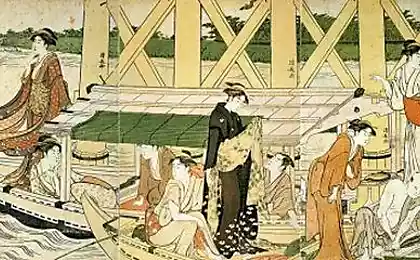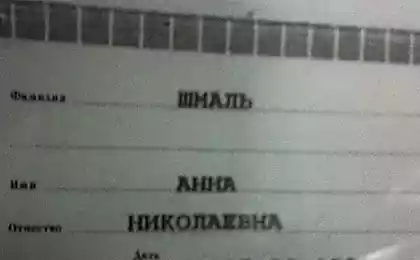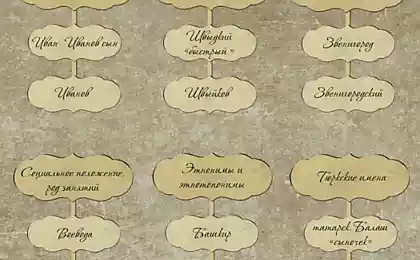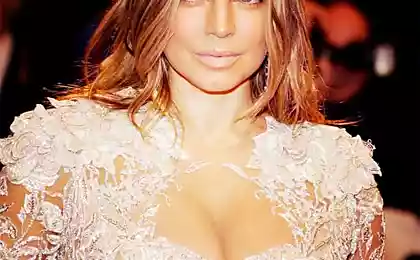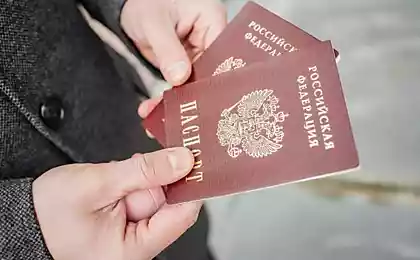996
What's your surname

Most of the population of the Russian Empire received the names of only towards the end of the XIX century. "The second name" root in people gradually, and more interesting to know how this happened.
Surname - not a luxury?
The first owners of surnames in Russia became notable residents of Veliky Novgorod. More from the XII century, this area was in a special position: received the status of an independent republic and independently conducted business with neighboring countries such as the Grand Duchy of Lithuania. From there came the fashion for names. And keep track of troops so it is much easier not to confuse one Michael, Ivan and Boris with another. For example, the earliest known list with the names of the dead, "of Novgorod as the pada: Kostyantin Lugotinits, Gyuryata Pineschinich, NamЂst, Fingering Nezdylov syn tanner ..." (First Novgorod Chronicle senior bringeth, 1240). After Novgorod in the XIV-XV centuries surnames got princes and boyars. The first usually were called by the names of the land they owned. So the owners of ancestral lands on the river Shuya began Shuiskys on Vyazma - Vyazemskaya on Meshchora - Meshchersky, the same story from Tverskaya, Obolensky, Vorotynsk and other -skimi. By the way, -sk- - a single Slavonic suffix, it can be found in the Czech surnames (Comenius), and Poland (Zapotocky) and Ukrainian (Artemovsk). The time of the last names is considered to be the descendants of its preservation, even after the loss of the corresponding land.
You'll be someone?
Boyars also got their names on the baptismal name of the ancestor or nickname: such names responded to the question "whose?" (Meaning "whose son?", "What kind?") And had a part in his possessive suffixes. Suffix -ov- joined worldly names ending with hard consonants: Smirnov - Smirnov, Ignat - Ignatov. -Ev- - The names and nicknames, having at the end of s, matched, or -s h: Bear - Medvedev, Yuri - St. George, Begich - Begichev. And Suffix -invariant received names derived from the names on the vowels "a" and "I": Apuhta -Apuhtin, Gabriel - Gavrilin, Ilya -Ilin. The most famous story of the emergence Boyar names - of the Romanovs. Their ancestor Andrew mare had three sons: Seeds stallion Alexander tree Kobylina and Fedor cats. They have generated Zherebtsova, Kobylina and Koshkin. The last wore that name for several generations, until they decided that referred to by the nickname is not too notable. And they first Yakovleva (named after the great-grandson of Fyodor Cats) and Zakharyin St. George's (named after his own grandson and great-grandson of another), and after all anchored in history as the Romanovs (named after great-grandson of Fyodor Cats). Many were surprised by such names as Durnovo, Sukhov, Zhivago, Chernago, Sedykh, Fomin. In fact, nothing strange they do not, all the same answer to the question "Whose?", Just a little out of date, or in the plural: Bad - Durnovo Live - Zhivago, Grizzly - Grizzly.
Russian - non-Russian name
Next in line for obtaining names were nobles. Among them were a lot of people who come to the service of Russian rulers from other countries. It all started with the names of the Greek and the Polish-Lithuanian origin at the end of the XV century and in the XVII century they were joined by Fonvizin (it. Von Wiesen), Lermontov (Shotley. Learmonth) and other names which have Western roots. Foreign-language fundamentals have the names that were given to the illegitimate children of nobles: Sherov (fr. Cher «road»), Amantea (fr. Amant «favorite"), Oksov (it. Ochs «Bull"), Hertz (it. Herz «heart» ). Adverse children do a lot of "suffering" from a fantasy parents. Some of them do not bother coming up with new names, but simply cut the old: because of Repnina born Pnin, of Trubetskoy - Betskoi of Elagina - Agin and of Golitsyn and Tenisheva altogether out "Koreans" Go and Te. We left a significant mark in the Russian names and Tatars. It appeared as Yusupov (descendants of the nobleman Yusup), Akhmatova (Ahmad Khan) Karamzin (Tatars. Kara "black", Murza "Mr. Prince"), Kudinov (Keystone. Kaz. Tatars. Kudai "God, Allah") and other.
Local, but princes
After the nobility began to receive names and just service people. They, like the princes, too often called the place of residence, but with the suffix "simpler": families living in Tambov became Tambovtseva, Vologda - Vologzhaninovymi in Moscow - and Moskvichyova Moskvitinovymi. Some gave "nefamilny" suffix denoting a resident of the territory in general: Belomorets, Kostroma, Chernomorets, and someone got the nickname without any changes - hence Tatiana Danube, Alexander Galich, Olga Poltava and others.
I Kastorsky
The names of the religious leaders were formed from the names of churches and Christian holidays (Christmas, Assumption), as well as artificially formed by Church Slavonic, Greek and Latin words. The most amusing of them were those that were translated from Russian into Latin and received the "prince" suffix -sk-. For Beavers became Kastorsky (lat. Castor «beaver") Skvortsov - Sturnitskim (lat. Sturnus «starling"), and the Eagles - Akvilevym (lat. Aquila «eagle»).
"Strange" names
The names of the peasants before the end of the XIX century were rare. The only exceptions were nekrepostnye peasants in the north of Russia in the Novgorod province - hence Mikhail Lomonosov and Arina Yakovleva. After the abolition of serfdom in 1861, the situation began to improve, and only at the time of a general certification in 1930 had exactly the name of every citizen of the USSR. They have formed a proven model: the names, nicknames, habitats, professions suffix -ov-, -ev-, -invariant. It turns out quite nice Petrov, Ivanov, Bochkarev, Kuznetsova, Melnikov Pryakhina and others. However, somewhere got out Perdunovy, Smertin and other Durakova. It is clear that they also originated from nicknames: fart, Death, the Fool, who deservedly or not their neighbors gave tribesmen. But after all, the parents called the children quite often insulting names: unloved, Nenashev, evil, stupid, Kruchina. As in his right mind could call it your child? The thing is that our ancestors were very superstitious and hoped to just such an unpleasant nickname to protect their child from the evil eye. In this connection, not the fact that some modern diamond will be luckier or Idiotova Neschastlivtseva.

